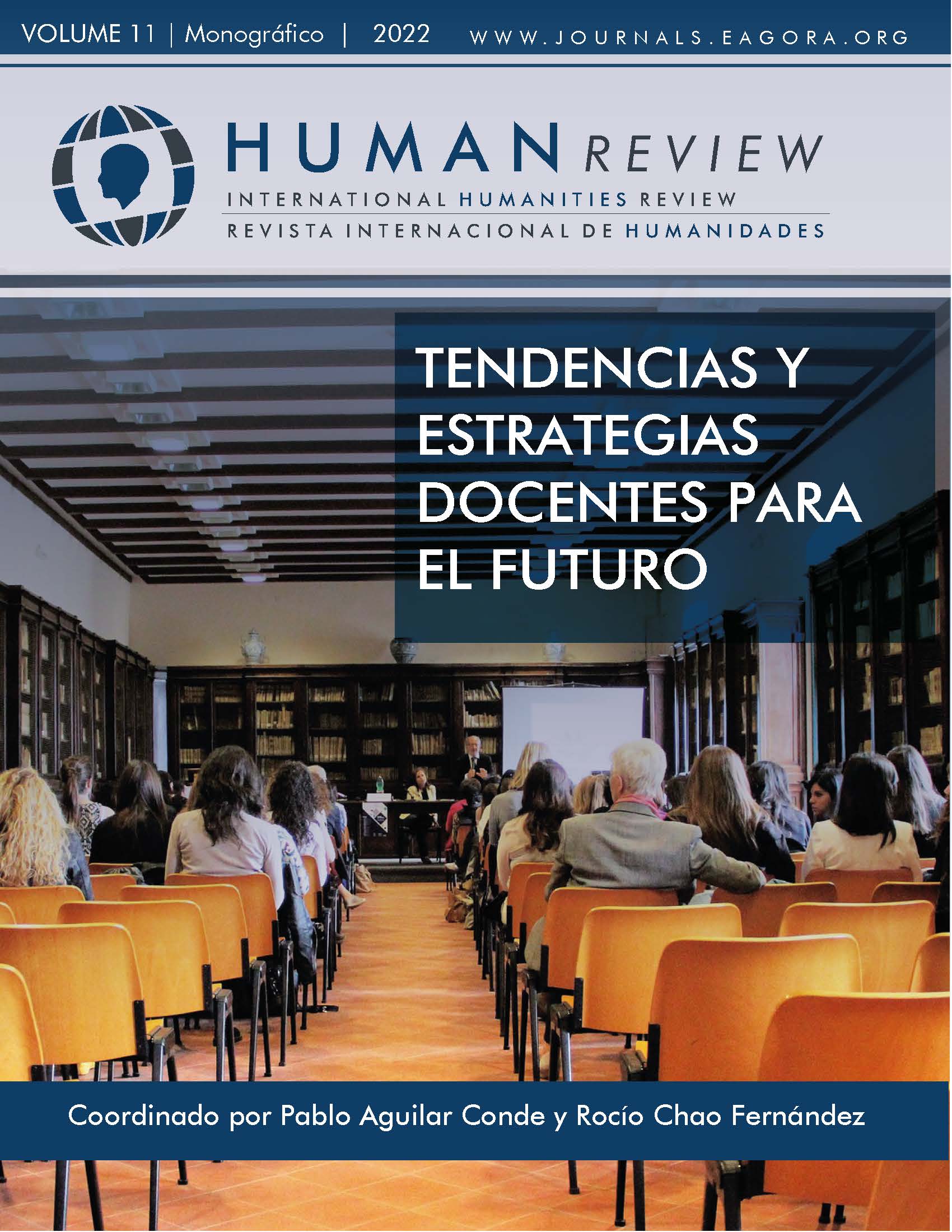University and Business
Disruptive training methodology for Wikiproducers
Keywords:
Disruptive training methods, Skills, Wikiproducers, Generation Z, Students, Business, UniversityAbstract
This study shows how disruptive training methods (DTM) equip students with skills that facilitate intergenerational and intercultural work. Skills and competences of leading international companies and institutions. A review of the literature on disruptive methodology has been carried out. The result shows how traditional education can be adapted to Wikiproducers and Generation Z students, to help them understand and develop some skills that their training is leaving behind, and that can be critical in their early stages of professional and personal life.
References
Adams, S. J. (2000). Generation X: How understanding this population leads to better safety programs. Professional Safety, 45(1), 26-29. https://vpnssl.urjc.es/dana/home/index.cgi/scholarly-journals/generation-x-how-understanding-this-population/docview/200457899/se-2
Arce, G. (2015). The impact of social networks in Net Generation (Millennials) [Tesis doctoral, Universidad Alfonso X el Sabio]
Barnes, C. (2014) Education & training- what´s the difference? Elearning industry. https://elearningindustry.com/education-and-training-what-is-the-difference
Bracy, C., Bevill, S., & Roach, T. D. (2010). The millennial generation: recommendations for overcoming teaching challenges. Allied Academies International Conference. Academy of Educational Leadership.Proceedings, 15(2), 21-25. https://vpnssl.urjc.es/dana/home/index.cgi/scholarly-journals/millennial-generation-recommendations-overcoming/docview/807512418/se-2
Blair, R., & Serafini, T. M. (2016). Training versus education: eLearning, hybrid, and face-to-face modalities–a participatory debate. Systemics, Cybernetics and Informatics, 14(5), 37-41. https://www.iiis.org/CDs2016/CD2016Summer/papers/SA910YZ.pdf
Brack, J., & Kelly, K. (2012). Maximizing millennials in the workplace. UNC Executive Development, 22(1), 2-14. http://hdl.voced.edu.au/10707/405117
Dannar, P. R. (2013). Millennials: What they offer our organizations and how leaders can make sure they deliver. The Journal of Values-Based Leadership, 6(1), 3. https://scholar.valpo.edu/jvbl/vol6/iss1/3/
Dale, E., & Nyland, B. (1960). Cone of learning. Educational Media. http://mcdn.nazwa.pl/MCDN_19/PROJEKTY/SIEC/EN/S3A3.pdf
Deal, J. J., Altman, D. G., & Rogelberg, S. G. (2010). Millennials at work: What we know and what we need to do (if anything). Journal of business and psychology, 25(2), 191-199. https://link.springer.com/article/10.1007/s10869-010-9177-2
Feiertag, J., & Berge, Z. L. (2008). Training Generation N: how educators should approach the Net Generation. Education+ Training 50(6), 457-464. https://doi.org/10.1108/00400910810901782
Hannay, M., & Fretwell, C. (2011). The higher education workplace: Meeting the needs of multiple generations. Research in Higher Education Journal, 10, 1. https://citeseerx.ist.psu.edu/viewdoc/download?doi=10.1.1.650.1663&rep=rep1&type=pdf
Hershatter, A., & Epstein, M. (2010). Millennials and the world of work: An organization and management perspective. Journal of business and psychology, 25(2), 211-223. https://link.springer.com/article/10.1007/s10869-010-9160-y
Holliday, W., & Li, Q. (2004). Understanding the millennials: updating our knowledge about students. Reference services review, 32(4), 356-366. https://www.emerald.com/insight/content/doi/10.1108/00907320410569707/full/html
Howe, N. & Strauss, W. (2009). Millennials rising: the next great generation. Vintage.
Huyler, D., Pierre, Y., Ding, W., & Norelus, A. (2015). Millennials in the workplace: positioning companies for future success. SFERC 2015, 114. https://digitalcommons.fiu.edu/cgi/viewcontent.cgi?article=1481&context=sferc#page=132
Jurkiewicz, C. L., & Brown, R. G. (1998). Generational comparisons of public employee motivation. Review of public personnel administration, 18(4), 18-37. https://doi.org/10.1177/0734371X9801800403
Kupperschmidt, B. R. (2000). Multigeneration employees: strategies for effective management. The health care manager, 19(1), 65-76. https://europepmc.org/article/med/11183655
Langan, K. (2012). Training millennials: A practical and theoretical approach. Reference services review. 40(1), 24-48.https://www.emerald.com/insight/content/doi/10.1108/00907321211203612/full/html
Oblinger, D. (2003). Boomers gen-xers millennials. EDUCAUSE review, 500(4), 37-47. http://fyp.utk.edu/wp-content/uploads/sites/31/2013/08/Oblinger-D.-2003.-Boomers-Gen-Xers-Millennials-Understanding-the-new-students.-Educause-JulyAug-36-47..pdf
Oblinger, D., & Oblinger, J. L. (2005). Educating the net generation. EDUCAUSE. https://cyberlearn.hes-so.ch/pluginfile.php/804144/mod_resource/content/2/pub7101.pdf
McNamara, B. R. (2009). The Skill Gap: Will the Future Workplace Become an Abyss. Techniques: Connecting Education and Careers (J1), 84(5), 24-27. https://eric.ed.gov/?id=EJ840446
Meister, J. C., & Willyerd, K. (2010). Mentoring millennials. Harvard business review, 88(5), 68-72. https://globalhealthtp.org/wp-content/uploads/2021/12/MentoringMillenials-Harvard-Business-Review-1.pdf
Prensky, M. (2005). Listen to the natives. Educational leadership, 63(4). http://cesa7ita2009.pbworks.com/f/Listen+to+the+Natives.pdf
Raines, C. (2002). Connecting Generations: The Sourcebook. Crisp Publications
Shaw, S., & Fairhurst, D. (2008). Engaging a new generation of graduates. Education+ training, 50(5), 366-378. https://www.emerald.com/insight/content/doi/10.1108/00400910810889057/full/html?fullSc=1&mbSc=1
Shuck, B., & Herd, A. M. (2012). Employee engagement and leadership: Exploring the convergence of two frameworks and implications for leadership development in HRD. Human resource development review, 11(2), 156-181. https://doi.org/10.1177/1534484312438211
Strauss, W. & Howe, N. (2003). Millennials go to college: Strategies for a new generation on campus: Recruiting and admissions, campus life, and the classroom. American Association of Collegiate Registrars and Admissions Officers.
Surbhi, S. (2015). Difference between training and education. Key Difference, https://keydifferences.com/difference-between-training-and-education.html
Sweeney, R. (2006). Millennial behaviors and demographics. Newark: New Jersey Institute of Technology, 12(3), 10.
Tapscott, D. (1998). Growing up digital (Vol. 302). McGraw-Hill Companies.
Yu, H. C., & Miller, P. (2005). Leadership style: The X Generation and Baby Boomers compared in different cultural contexts. Leadership & Organization Development Journal, 26(1), 35-50. https://www.emerald.com/insight/content/doi/10.1108/01437730510575570/full/html
Wesner, M. S., & Miller, T. (2008). Boomers and millennials have much in common. Organization Development Journal, 26(3), 89. https://www.proquest.com/docview/198009222?pq-origsite=gscholar&fromopenview=true
Downloads
Published
Issue
Section
License
All articles are published under an Attribution-NoDerivatives 4.0 International (CC BY-ND 4.0) license. Authors retain copyright over their work.

